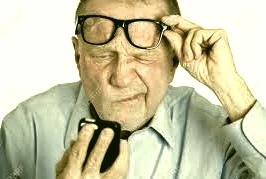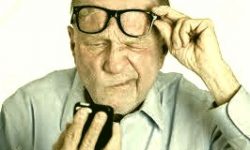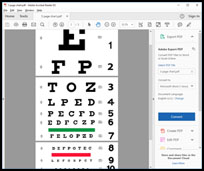As a child and teen, I had the strongest glasses of anyone I knew. I got gas permeable hard contacts at age 16, my parents hoping to stop the progression of my “galloping myopia”. Because these had an astigmatism correction too, they were weighted to stay in the same orientation and not rotate in my eyes.
Even though I considered my poor eyesight a defect, and felt guilty because my parents had to spend money on my glasses and contacts, I took a strange kind of pride in having such an extreme problem. It made me special. “Look at what I’m dealing with that others don’t have to!”, I thought, similar to the attitude someone in a wheelchair might have.

Back then I had no idea what astigmatism was, but this seemed to make me more unique — I wasn’t just plain old near-sighted! (To understand astigmatism better, read this.) Of course it’s human nature to want to feel special. However, I think taking too much pride in a trait you’d really like to change is sending the body mixed messages.
A good friend of mine, whom I actually met in the eye doctor’s office years ago, is almost as near-sighted as I used to be, about -9. When she told me she had beginning cataracts, she added that our holistic optometrist had suggested her myopia wasn’t enough to keep her from seeing, so now she might be resisting the clarity even more by developing cataracts!
This sounded harsh to me, but she seemed almost proud of her determination. I remembered she had told me that at an early visit to a different holistic vision doctor, she was proud of how hard her eyeballs were, like pumped-up muscles in the gym! Healthy eyeballs should be soft and moist and yielding. This felt similar to being proud of a vice, like how much alcohol you drank.
I am grateful for my challenges with vision. The ongoing process of healing it has taught me an enormous amount about myself. Yet being proud I’ve had this problem (even though I’ve significantly overcome it) feels wrong. It keeps me tied to the struggle, when I want to move past it! Vision improvement remains important to me, and I don’t want it to be my only focus (pun intended).
Life is to be enjoyed, and we’re here to learn and grow, not strive and suffer. I’m putting my attention on what’s going right, not what still needs to be fixed. I’ll probably always be working on improving my vision, even after I reach 20/20. I am proud I’ve improved as much as I have, and that I’m open to learning even more as I go forward.
I wore strong glasses, then contact lenses, from age 5 into my 40s. While making many mistakes, eventually l learned how to improve the way I use my eyes and to see in a more relaxed, healthy manner. It is my pleasure to coach others to do the same. Visit me at https://NancyLNeff.com.


Anna, thanks for your thoughts. Yes, social pressure not to be too full of ourselves plays a part here. In the past when I was praised for something, I usually pointed out that even though I was good at X, my vision was poor, to make the other person feel better. That just kept me hanging on to that limited view of myself. Now I keep the focus on the positive and on growth, what I can do now that I couldn’t do before, while realizing that in some areas I still have a long way to go to be happy with myself. Plus when people comment on me, it’s often a hidden comment about them and their insecurities — “You’re so slim!” really means “I’m feeling fat” for example. So I always try to project acceptance and reassurance. We’re all doing the best we know how.
Irina, I agree about possibly seeing a vice as an expression of their energy. And maybe when they want to be proud of something, they look at themselves and it’s easier to find a negative trait than a positive one. People are so interesting!
Maybe it’s also that ous vices and physical problems are easier to see. Myopia or an injury or a smoking habit are something you deal with everyday, easy to spot. So it becomes something our brain occupies itself with. Good traits are often things that are only seen under certain circumstances.
Another thought: we’re taught that praising ouselves is bad, humility is a good thing. So what else are we to talk about than who is worse off or doing more stupid things? It might be an acceptable way to brag 😉
Anyway, interesting article and comments.
David, good point. I’ve always used vigorous exercise to get out some of my stress, and once I discovered tools like meditation and EFT to calm my nervous system, I became a much healthier person, and also nicer to be around. The eyes aren’t separate, they’re part of the whole body, so if your body or mind is stressed your eyes will probably be too.
Sometimes I have to say, no, I don’t want to see your scar, and I wish I hadn’t scrolled myself into your ghastly bloody injury pic on my Facebook feed. Knock it off, people! I’ll take your word for it how tough you are, no pics required, I promise!
I think we look for struggle. Our society has taken us away from the dangers of getting killed by hungry beasts or an enemy tribe, and we look for some kind of physical struggle. We need that outlet. We have the energy built in to deal with it, and it has to be used. Maybe sometimes vision problems and other ailments are what happens. Not to mention domestic violence. Not that it explains crime, but it’s that pent up energy that we don’t always have an obvious and accepted way to release.
that goes quite well with what Nancy said in her article too, and I was thinking, about people being proud of their particular vice (you do hear this a lot, like someone bragging about smoking a whole packet of cigarettes a day and someone else saying, ‘ha, that’s nothing, I smoke two!’) I have often wondered why people brag about that kind of thing, but you could be right – they’re ‘proud’ of what they subconsciously perceive as an expression of their energy and strength… lots of food for thought here guys, thanks!
Thank you, my friend. If you see that I’m self-aware, it must be in you too. 🙂 Enjoy your day!
This is a beautiful article, Nancy, with great insight (pardon the pun!) You are truly one of the most self-aware people I know.